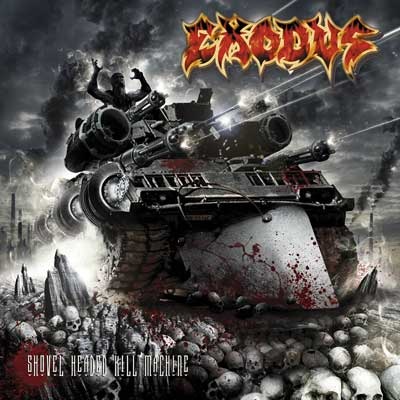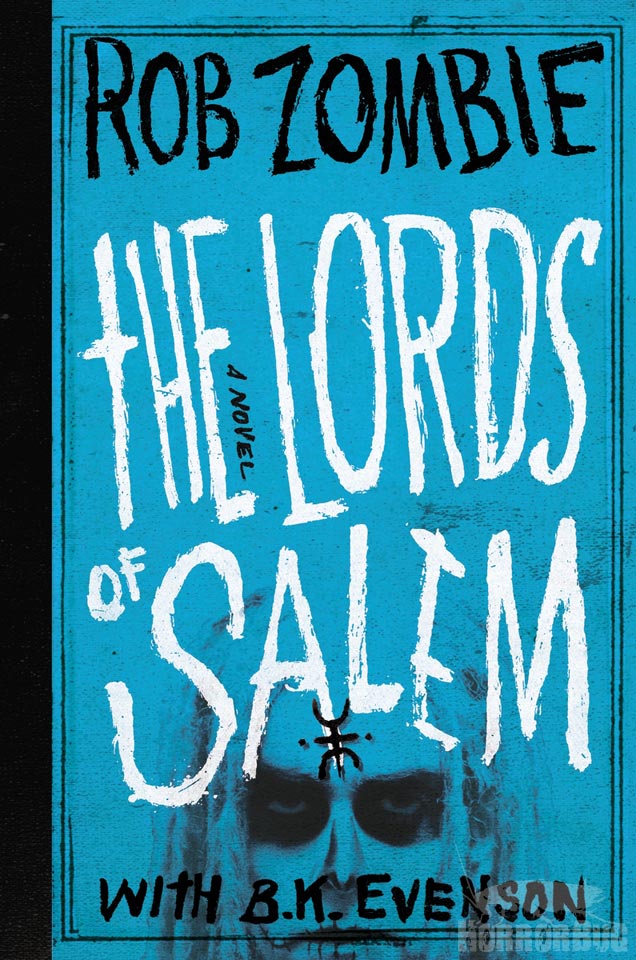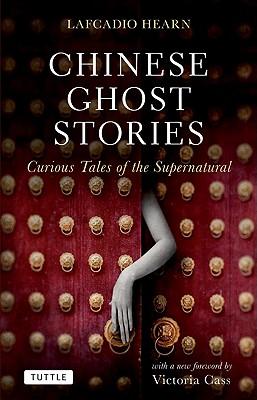 When people say “time has passed”, they actually mean “events have happened in the time that has passed”. The number of years doesn’t matter, just the changes the years have wrought. Thrash metallers Exodus released Force of Habit in 1992 and then did not put out another studio album for twelve years, but 2004’s Tempo of the Damned found them playing the same style with nearly the same lineup. Yet just one year later, Exodus had fallen apart and had reformed with radically different members, and a modern, quite different style.
When people say “time has passed”, they actually mean “events have happened in the time that has passed”. The number of years doesn’t matter, just the changes the years have wrought. Thrash metallers Exodus released Force of Habit in 1992 and then did not put out another studio album for twelve years, but 2004’s Tempo of the Damned found them playing the same style with nearly the same lineup. Yet just one year later, Exodus had fallen apart and had reformed with radically different members, and a modern, quite different style.
Rick Hunolt is out, Heathen’s Lee Altus is in. Tom Hunting is out, frequent Slayer fill-in drummer Paul Bostaph is in. Most worryingly, Steve Souza is gone again, probably forever this time, and in his place is one of metal’s less convincing frontmen: Rob Dukes.
To be honest, this guy’s vocals take a lot of getting used to. Possibly an infinite amount of getting used to. Souza had a nice Mustaine-like snarl. Dukes’s voice is a haggard bark, like a cranky old person and a chihuaha rolled into one. He’s VERY limited vocally, just be thankful he doesn’t try any clean singing (go straight to The Atrocity Exhibition: Exhibit A for that…eww.)
Fortunately, the band’s wunderkind guitarslinger Gary Holt is still in evidence, and he puts out his usual barrage of hard-edged thrash riffs. The upgraded Exodus war machine unleashes brutal song after brutal song…although they often don’t have the consistency one would like.
“Raze” is a certified winner. It’s not a song, it’s a slash at your neck hard enough to decapitate the three people behind you.. “Now Thy Death Day Come” and “Going Going Gone” are more songs in the same vein, featuring brutal riffs and a heedless forward charge worthy of a Tennyson poem. “Deathamphetamine” is a little more varied…in quality, and in tempo. It has lots of great moments, just not enough to carry it across its 8:31 running time. Exodus seems to have caught Metallica’s disease of finishing a song and then continuing for 2 or 3 minutes.
“Shudder to Think” and “Altered Boy” are heavy midtempo tracks. Their primary strength is Sneap’s dense production style. “.44 Magnum Opus” has a great title, and great lyrics. “A motherfucking Van Gogh with a gun”…Exodus lyrics are always best when they’re tongue in cheek, and it’s a shame that they become all faggy and serious on their next release. The title track is quite short and not very focused musically. The band didn’t seem to put much thought into writing it. Turnabout’s fair play, I didn’t put much thought into listening to it. “Karma’s Messenger” has some harmonised riffs, giving it a slight Arch Enemy character. The Japanese release has two bonus tracks, a Sex Pistols cover and “Purge the World”, wherein lies more thrashing.
“Shovel” is brutal and heavy…but it’s very different from past Exodus releases. It has a different feel and flavour from the classic albums, and although the riffs are still great, some of that classic Exodus swagger seems to have disappeared. The band sounds quite mechanical and lifeless these days, the odds of them writing another song like “Toxic Waltz” are slim. Bonded By Blood and Shovel Headed Kill Machine are like the T-800 Terminator and the T-X, respectively. Kristanna Loken might be harder and meaner, but people will always feel more attachment to the fleshy, bleedable Arnold Schwarzenegger.
No Comments »
 Lords of Salem is a novelisation of Rob Zombie’s 2013 movie, which was adapted from a song on Rob’s 2006 album Educated Horses. The franchise now exists in three mediums, literature, cinema, and music. Impressive, although a true renaissance man would have released Lords of Salem knitting patterns by now. Note that it is a “collaboration”, which means that BK Evenson wrote 99.95% of the book and then Rob went over it once with a red pen. I have not seen the movie, but apparently this is a bit different.
Lords of Salem is a novelisation of Rob Zombie’s 2013 movie, which was adapted from a song on Rob’s 2006 album Educated Horses. The franchise now exists in three mediums, literature, cinema, and music. Impressive, although a true renaissance man would have released Lords of Salem knitting patterns by now. Note that it is a “collaboration”, which means that BK Evenson wrote 99.95% of the book and then Rob went over it once with a red pen. I have not seen the movie, but apparently this is a bit different.
There’s a prologue set 1692, and we learn that there really were witches in Salem. They are arrested while performing a ritual of some kind, and they die threatening to haunt the town forever. I wish this part wasn’t there, to be honest. Crazy, over-the-top prologues make sense in an action movie, where you have to give the audience some of what they paid for, but all this scene accomplishes is to remove any sense of mystery and ambiguity from the story. The plot is now spoiled, you now know what’s going to happen, it’s now just a matter of running out the clock.
Why not be coy, and keep the evil in Salem hidden? Why not make the reader as ignorant as the protagonist? Why stick a big “COMING SOON: WITCH ATTACK!” sign right at the start of the book?
The prose needs a pair of crutches. “She cast her eyes around desperately.” Don’t cast them around too desperately, eyes are delicate things. This book also contains the most awkward adverb ever observed by science: “She flailed ropily.”
Lords of Salem soon shifts to the present day, where radio DJ Heidi Hawthorne (a descendent of the judge who doomed the Salem witches) receives a record from a band calling themselves the Lords of Salem. She plays it, and horrible events start occurring in the town. Unfortunately, the Lords of Salem don’t just aspire to radio stardom, they are also coming to town, and Heidi must sell concert tickets.
This section of the book is much better. It flows, it doesn’t seem to be trying too hard at all, and the characters were great. The dialogue has a snappy, fun quality, and although I doubt Rob was involved much with this book, Lords exhibits all the signs of being adapted from one of his screenplays. Rob writes “character” very well, and his naturalistic dialogue was a big part of why The Devil’s Rejects was as good as it was.
Lords has lots of creepy, violent, supernatural shit, but lots of not so great horror movie ideas, too. The main characters are very good at surviving. Save for the confusing and murky ending, all the deaths are died by bit players and randoms. It devalues the scary scenes to know that the author is standing on cue, ready to rescue Heidi from danger because the plot requires her to live. Churchill once said “Nothing in life is so exhilarating as to be shot at without result.” The corollary is “Nothing in life is so unexhilarating as to see a character get attacked by a monster without result.”
Rob says he released a novel tie-in out of nostalgia for his own childhood, when novelised versions of books were common. They’re not common now, and maybe that fact alone is the edge Lords of Salem needs. It’s a flawed but definitely interesting book. Fans of Rob’s work will probably be very enamoured by it.
How long they’ll be enamoured for is something I don’t know.
No Comments »
 Translated and adapted a century ago by Lafcadio Hearn (a “thief of myth”), this is a collection of six traditional Chinese folk tales.
Translated and adapted a century ago by Lafcadio Hearn (a “thief of myth”), this is a collection of six traditional Chinese folk tales.
In simple, unaffected writing, we are presented with ghosts and spirits that are benign and helpful. These are stories about loyalty: to kin, to the gods, to the Emperor, even to mundane things like one’s craft or profession. Western ghost stories frighten, Eastern ghost stories inspire.
“The Soul of the Great Bell” tells of a mighty bell, commissioned by the Emperor, designed to be so loud that it could be heard 30 miles away. Its construction is plagued with difficulties. Each time it is cast, the metals crack and fissure, and the lips slag and split asunder. With the project failing, and the Emperor’s anger mounting, the chief bellmaker’s daughter Ge-Ai sacrifices herself to the foundry furnace, for only through the flesh of a maiden can the bell be made. It is said that the tolling bell had the sound of Ge-Ai’s voice. People live such short lives, and I wonder if that’s the reason long-lasting things like buildings and bells are sometimes considered halfway-houses to the supernatural.
“The Return of Yan Zhenjing” is a violent, warlike piece, set during the Tang Dynasty. Li Xilie, “a soldier mighty for evil“, is tearing the realm apart, and Supreme Judge Yan Zhenjing is sent to bring the rebel back to the Emperor’s side. Xilie first tries to break Zhenjing (and fails), tries to woo him (and fails), and tries to kill him (and succeeds), but Zhenjing’s defiance and courage sucks the sweetness from the act. War against Xilie is rejoined, but Zhenjing’s ghost finds a way to return to the Emperor. “Son of Heaven, the mission confided to me I have performed; and thy command hath been accomplished to the extent of thy humble servant’s feeble power. But even now must I depart, that I may enter the service of another Master.”
All the stories entertain, but Lafcadio’s most powerful find is “The Tale of the Porcelain God.”
It is superficially similar to “The Soul of the Great Bell”, but with a disturbing and neurotic edge. Master porcelain maker Bu is given the task of creating porcelain with the texture of flesh. His job consumes him to an extent that is terrible to witness even through the pages of a book. He works tirelessly, but failure piles up on failure. Soon, he realises that the ultimate sacrifice may be required, and he makes this sacrifice without a look back. The ending is not triumphant but understated and maybe even a bit mocking, the Emperor’s porcelain does not seem worth the price Bu paid. An afterword by Hearn makes the story even more troubling.
“The Emperors of China are, during their lifetime, the most redoubted of divinities, and they believe that nothing should ever stand in the way of their desires. It is so related that once upon a time a certain Emperor insisted that some porcelains should be made for him according to a model which he gave. It was answered that the thing was simply impossible: but all such remonstrances only served to excite his desire more and more…The officer charged by the demigod to supervise and hasten the work treated the workmen with great harshness. The poor wretches spent all their money, took exceeding pains, and received only blows in return. One of them, in a fit of despair, leaped into the blazing furnace, and was instantly burnt to ashes. But the porcelain that was being baked there at the time came out, they say, perfectly beautiful and to the satisfaction of the Emperor. From that time, the unfortunate workman was regarded as a hero; and his image was made the idol which presides over the manufacture of porcelain.”
This is a powerful and interesting collection. My only comment is that I wish these tales had a Chinese teller. We see them the way the author wants us to see them, and there’s always the question: is this is a story from China…or a story from Lafcadio?
No Comments »
 When people say “time has passed”, they actually mean “events have happened in the time that has passed”. The number of years doesn’t matter, just the changes the years have wrought. Thrash metallers Exodus released Force of Habit in 1992 and then did not put out another studio album for twelve years, but 2004’s Tempo of the Damned found them playing the same style with nearly the same lineup. Yet just one year later, Exodus had fallen apart and had reformed with radically different members, and a modern, quite different style.
When people say “time has passed”, they actually mean “events have happened in the time that has passed”. The number of years doesn’t matter, just the changes the years have wrought. Thrash metallers Exodus released Force of Habit in 1992 and then did not put out another studio album for twelve years, but 2004’s Tempo of the Damned found them playing the same style with nearly the same lineup. Yet just one year later, Exodus had fallen apart and had reformed with radically different members, and a modern, quite different style.

